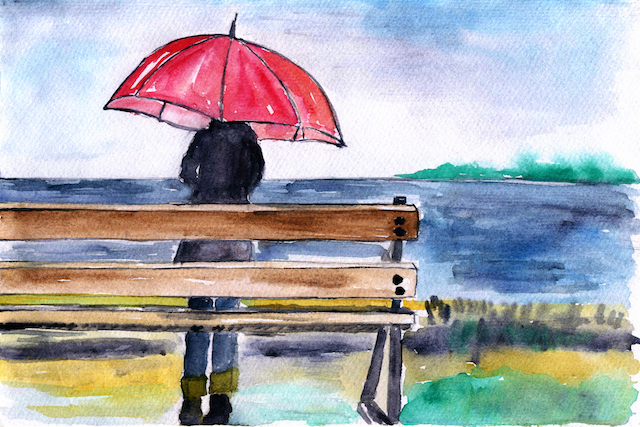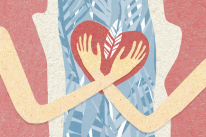“Most of the shadows in life are caused by standing in our own sunshine.” ~Ralph Waldo Emerson
How many times have you heard “Follow your heart” or “Let emotion be your guide”?
Too many to count, I’d bet.
It’s generally good advice; it’s certainly wiser to follow your own feelings than to blindly do what other people think you should do.
But reading into your emotions can also lead you astray.
You see, you are always feeling your thinking. You are not necessarily always feeling “the truth,” or even your own personal truth.
Every emotion, feeling, or mood you experience follows directly from the thinking you are experiencing. That thinking is not always accurate or important. It does not always indicate what’s best for you.
In reality, your feelings are nothing more than feedback about your thinking.
Feelings are not feedback about your mental health, the state of your life, or whether you have the “right” job, partner, or dietary habits.
I used to think they were. When something in my environment seemingly aroused negative emotion in me, I’d jump into action. Life became a game of adding in the “right stuff” and subtracting out the “wrong stuff” in order to feel as good as possible.
I thought this was very enlightened; after all, I was no longer willing to put up with what didn’t feel good and I was consciously choosing more of what did.
I’d notice some negative feelings about my job and immediately start looking for a new one. Clearly, my job wasn’t a good fit. I deserved a job where I could be nearly-always happy, I reasoned.
Predictably (in hindsight), the moment I decided the job wasn’t a good fit, a million examples of how it wasn’t perfect would show up—things I had never noticed before. I took those as “signs”—further evidence that I had better focus on that exit strategy, and fast.
Since I decided that my job was the cause of my distress and that I’d feel much better when I found a new one, that naturally led to the conclusion that that I wouldn’t feel better until I was in that new job.
I innocently set things up so that I couldn’t possibly be happy until I made the change that was supposed to fix everything.
I also did this in reverse, by the way, adding in more of the good-feeling “stuff” that I thought were the source of the positive emotions I craved.
Although I thought this an enlightened way to be, hunting and gathering good-feeling “stuff” and playing whack-a-mole with bad-feeling “stuff,” it was based on the gigantic illusion that my feelings were based on my surroundings.
In truth, my feelings were simply feedback about my thinking, and my thinking was not dictated by my job or anything else outside of myself.
Thinking isn’t dictated by anything. It just arises, with emotion tagging along, and we hold on to it and tell stories about it.
Or we don’t.
Nothing needs to be done.
Rather than jumping into addition or subtraction action, relax. There is nothing to do with or about bad feelings. Because thoughts are transitory, impersonal, and always in motion, feelings are too.
The word emotion means in motion, as in always moving.
From the time you woke up this morning to right now, you’ve probably had a few hundred thousand thoughts and feelings to which you paid virtually no attention. Paid no attention, they promptly floated away—in motion—and were replaced by new thoughts and feelings.
Each time your mind drifts from the morning staff meeting to your lunch plans and back to the meeting again, it’s happening. Each time you cycle through, “I’m having a fantastic hair day” to “Did I clean the cat hair off this jacket?” to “I hope it’s warm enough to go without a jacket tonight,” it’s happening.
Thoughts and feelings change all day every day with absolutely no effort or fanfare.
This would be true of all thoughts and feelings if you treated them all the way you treat the ones about meetings, lunch, and hair.
But since you’re human, you don’t treat them all the same. You hold on to some thoughts and spin them around in your mind. You give them importance and meaning. You imbue them with emotion and attention, which are the equivalent of mental superglue.
Thoughts are like breath—when you stop holding your breath, new breath rushes in. When you stop holding your thoughts, new ones rush in, bringing new feelings in tow.
All you ever have “to do” is nothing. The only position you ever have to take is of non-interference.
What’s Possible
Nearly everyone I talk to wants bad feelings to go away. Even when they intellectually understand that bad feelings aren’t meaningful or harmful, and even when they intellectually get that feelings are always in motion, they feel down and instantly try to feel better.
They think I’m naive or unrealistically spiritual when I tell them that bad feelings don’t have to be a big deal. They don’t have to feel so “bad.”
“You don’t understand my emotions,” they say. “Mine hit harder than others’.”
Or, “But everyone knows shame is the hardest to handle,” or “I’ve had these since birth, so they’re more real than most.”
I still say they don’t have to be so bad.
The more you understand that your experience of life is entirely thought-created and that “you” aren’t what you think you are, your attachment to feelings—good and bad—begins to shift.
You connect and identify with something deeper, something beyond fleeting feelings.
It becomes obvious that bad feelings are only your surface psychology; they can’t touch who you truly are. You can rest in your true self which is always stable and always there.
As it turns out, much of the negative experience of emotions is the cover-up. It’s when you resist, hide, or try to change those emotions that you experience them as painful.
When you do that, you’re playing with mental superglue again. You’re putting so much pressure and focus on those emotions that they are held in place. Remember, when you don’t hold on to thought and emotion, new thought and emotion rushes in.
I can honestly say that my experience of bad feelings is drastically different than it once was. This may sound insane, but I don’t mind feeling “bad” so much anymore.
In fact, sometimes it’s kind of nice to settle into a bad mood. It’s a little like the comfort you might find in a rainy day once you accept that the rain is a reality and stop wanting it to change.
I find myself deciding to just lay low and ride out the mood, just like I would the rain. I know it will change. Paradoxically, when I approach bad moods in this way they end up changing before I have a chance to experience them as “bad.”
Emotions are naturally in motion. There is an awareness and distance that prevents me from being taken down by them.
This is completely possible for anyone, even you.
About Amy Johnson
Dr. Amy Johnson is the author of several books, including The Little Book of Big Change: The No-Willpower Approach to Breaking Any Habit. She is also the creator of The Little School of Big Change, an online school that helps people find lasting freedom from habits and anxiety. Please go here to get a free sneak preview of the school.














 Though I run this site, it is not mine. It's ours. It's not about me. It's about us. Your stories and your wisdom are just as meaningful as mine.
Though I run this site, it is not mine. It's ours. It's not about me. It's about us. Your stories and your wisdom are just as meaningful as mine.
Hmmm posts like yours do confuse me. Do you mean that we should stay in difficult situations forever? When my husband was bullying me it didn’t feel good, my thoughts agreed, and so I started to make changes so that it stopped happening. When my boss asked me to spend most of my time doing an impossible and unrewarding job, I felt stressed and couldn’t sleep, so I found a new job and left. I don’t label my feelings good or bad – they’re just feelings – but I don’t know they were a poor guide in those situations. I am sure I could learn no end by staying in an abusive relationship but I don’t think it would be a good choice for me – or my children.
Hi Dolce Vita,
Nope, I’m definitely not suggesting you stay in situations you don’t want to be. When your husband was bullying you, you knew you wanted to leave so you left–perfect! I’m only saying that our natural response when we feel badly is to look outward and immediately try to change something in the world, when in reality, our feelings come from our thinking. Understanding that thoughts–>feelings link in and of itself is super helpful. Sometimes you’ll still want to change circumstances and that’s great. And sometimes you won’t, and that’s great too.
Great post… beautifully focused and points to the (difficult to learn, at least for me) reality that happiness is not “out there”, and that every negative (i.e. “unhappy”) emotion is not a sign from the universe to change something “out there”…
Thanks, Marley!
P.S.–hard for me to learn that too!
This post really speaks to me. I find myself happiest when I let go and feel free.
And I don’t mean when I have 100% freedom. It’s when I acknowledge that at the moment, I can’t change my situation. But I recognize I can control the food I eat, how I react to it, and how I feel.
I like how you talked about being reasonable – I’m a reasonable person, but I’m also emotional. I used to believe I had this underlying sadness – but after reading this, that belief has changed.
Because now I know, that their on the outside, and I’m the only one on the inside with my feelings, actions and words. No outer forces – like negative people – can hurt you if you don’t let them effect you. And nobody wants to be hurt – and I certainly don’t want to be 90% happy, I want to be 100%.
I’m still working on making it a habit…thank you for not mentioning being grateful – it’s something underlying that everybody knows. Instead, you spoke about change and freedom.
Thanks for a good read.
Very very interesting. I’ve never thought of moods in this way before and it makes perfect sense to do so. Great job!
Often a bad mood/ depression is due to fearful thoughts of a situation/ incident that has not occurred and may not ever occur. To worry about a future that is not absolutely certain creates unnecessary stress. So in this context I can see how Amy’s advise of simply being aware of our thoughts and the fact that they are transient, not permanent, and therefore not being attached to any particular thought, good or bad, can help one live their life with more equanimity. In your particular case though, the bullying or work related stress was a reality and not something you thought might occur in the future, so you were absolutely correct in listening to your thoughts/ feelings and extracting yourself from the situation.
Thank you, great text. And something I, as a feeler, have found extremely helpful when it comes to living with feelings is some scientifically proved biology:
Each emotion that is created in us leaves a chemical fingerprint in our bloodstream – a fingerprint that evaporates by 90 seconds. If the feeling or emotion lasts longer than that, it’s us maintaining it through thought. The timeframe has proven helpful in navigating my emotional and mental realms. 🙂
synchronicity: “But the horrible truth of life is that this whole less, being friends with your own heart, is ALWAYS going to be an inside job.” See Anne Lamott status post on FB today.
“emotion is not a sign from the universe to change something “out there”…” ah, my new mantra!
Thank you that article was really helpful and addressed something been working on for ages! Interesting useful way to view moods. Thank you again Graham
I love the message of letting the bad thoughts and bad feelngs go so that others rush in!
That’s very simple yet smart and useful for our daily-basis life.
Thanks for your post!
🙂 It’s a good one!
Thanks Dania–I LOVE that you no longer see yourself as having underlying sadness. I’d say you have occasional sad thoughts, like the rest of humanity, but your underlying nature is quite peaceful. xo
Thank you, I’m glad it resonated with you!
YES, I love the 90 second fact too! That little finding has made life so much easier. Glad it has for you as well. xo
Nice!
I’m so glad it was helpful, Graham!
I love that thought/breath analogy too! Thanks for your comment!
It’s funny how many ‘see’ signs and think they should act when in reality, it’s what’s in their conscious awareness that’s showing up. As you say, the thoughts we think set up the feelings we feel.
Little kids really point the way. Feel the feeling, good or bad and let it go. There’s plenty more where they came from. It’s those stuck feelings that cause us grief.
I used to be a worry wort and then I decided to set time each day to worry….I could give myself ten whole minutes to worry away, then I needed to let it all go. Funny thing happened, after a few days, I couldn’t even worry for ten minutes…it made me laugh.
Enjoyed your perspective on this.
Elle.
I understand now what it means when my boyfriend says he is not emotional. It’s not that he doesn’t have emotions. he just doesn’t let them control him. well explained in this article. Thank you.
I am so with you, Elle, on the kid point. They absolutely show us the way (if we’d just realize they are wiser than us and listen!).
Love that you can’t worry for 10 min anymore 🙂
That’s great, Cherie. I bet a lot of women with “unemotional” men could benefit from that little insight of yours!
We each create our own matrix, replete with triggers and programmed responses thanks to the ego. When something makes us feel bad, we immediately look outside for the cause. It’s the ego’s reaction (self-sustaining) coming from deep within. Protecting its “integrity”. Once we learn to intercept that response and adjust it accordingly, we begin to own our feelings and not look to others for fulfillment.
It comes down to unlearning. Reprogramming. A little bit at a time. Your “Emotions are naturally in motion. There is an awareness and distance that prevents me from being taken down by them” reminds me of the descriptor for “emotion,” identified as “Energy-in-motion. Thoughts are inevitable, what we do with them is our choice. “I don’t mind feeling “bad” so much anymore.” Either do I. It’s happening for a reason, and it’s productive to find out why. Observe the thought, don’t become it. It’s the unlearning and reprogramming in action. Redefining the matrix. And taking the Red Pill.
Thanks, Amy, for your insight.
~ Mark
I love how you focus on the intension of thought and how emotions are soo connected to the things we hold in our minds!
Thank you – that makes sense. 🙂
Thank you – I think I see what you mean!
Love the thought/emotion/breath analogy – such a simple concept of just letting our thoughts and emotions just flow in and out. Funny how I usually exhale longer than I inhale when practicing yoga – I’m consciously trying to get rid of stuff obviously. I also love the concept that our feelings are just baggage we attach to our thoughts, rather than something so much stronger – takes away the excuse that while we can change our thoughts, it’s much harder to change our feelings.
Great post Amy. Love this “Emotions are naturally in motion. There is an awareness and distance that prevents me from being taken down by them.” A good reminder to me to let emotions flow through, having awareness of them but not attaching to them as if define me and my circumstances.
Thanks, Bernadette! After having been “taken down” by emotions for most of my life it’s really nice to have that not the case 🙂
It’s so easy to forget that our emotions are only thought, isn’t it? Thanks for your comment!
Thanks, Kathy! Deep exhale…)
Thanks for your insight, Mark. I agree that UNlearning and UNdoing is where it’s at and luckily, those take very little “work”. Thanks for sharing your thoughts!
Thank you so much for such a wonderful post.At this moment of time this is exactly what I needed.
wow great post! But I have one question: if you get a depressed I want to cry feeling, just ride with it and cry? act on all your feelings or??
What a wonderful post, and perspective regarding thoughts, feelings, and being in a bad mood! I love the analogy of breathing. Thank you for sharing this view, story, and wisdom!! 🙂 Awesome!!!!
Thank you, I’m glad you found it helpful!
So glad to hear that 🙂 xo
Hi Gitte,
Yeah, do what you feel because frankly, what’s the alternative? Trying NOT to cry doesn’t work. Judging your feelings doesn’t help. I can’t think of a sensible alternative to just riding them out and doing what occurs to you to do with them. Thanks for your question!
I LOVE this. Lately I have been focusing on pushing out the pain of the abuse I suffered as a child. Now I realize that putting energy into pushing out the pain is still feeding the pain- I’m still letting it take root in my mind. I get it now. This is the best article I’ve read!!! Thank you so much!!!!!!! The painful thoughts my still come but I can choose to just let them be, let them slide on by!! I’m SOO grateful that I just read this. Namaste!
I made poor choices in life. I missed the opportunity to be with the man I wanted in life. I am miserable. I do not know how to feel good about myself. All I could think of the life that I could have had with him and it eats me up.
Great read!
Watch the movie “Seeking a friend for the end of the world” with Keira Knightly and Steve Carell. It should help a little bit.
I love this post its exactly what I needed to hear I never thought of thoughs that way now I can try snd understand them or maybe I won’t be so depressed or won’t be so depressing sorry
this was really good. thank you
I realised this same thing only in the last few weeks 😊 it actually became really clear to me during meditation. Although I had the intellectual understanding already, it’s as if it was emphasised to me. Then when I got into bed I asked for reassurance that it was okay to percieve my emotions as impersonal and transitory (it’s like I fall back into worrying I might get it wrong, “but what about that article that said “your emotions are your compass”!”) after asking I immediately felt my soul as residing within my body, where I had previously put my attention in my head . It’s now much easier to stay grounded during turbulent emotions. 😊
Thank you so much for sharing this. I have understood this intellectually for a long time, but your words helped unlock the next layer of true understanding.